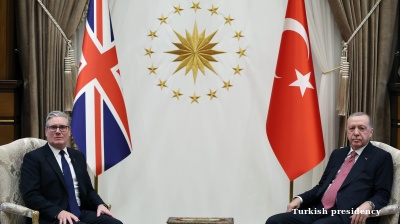“Biggest step in Turkish censorship history” as TV watchdog gets sweeping oversight over all online content

Turkey on August 1 gave its radio and television watchdog RTUK sweeping oversight over all online content, including streaming platforms like Netflix and online news outlets.
Kerem Altiparmak, a human rights lawyer, said on Twitter that the move was the “biggest step in Turkish censorship history”. All outlets producing opposition news would be affected, he added.
“Everyone who produces alternative news and broadcasts will be impacted by this regulation,” Altiparmak tweeted. “Every news report that can be against the government will be taken under control.”
The move, designed to protect Turkey’s “moral values” according to its proponents, was initially approved by Turkey’s parliament in March last year. It was backed by the ruling coalition made up of President Recep Tayyip Erdogan’s ruling Justice and Development Party (AKP) and its ultra-nationalist ally, the Nationalist Movement Party (MHP).
The regulation was published in Turkey’s Official Gazette. All online content providers are now mandated to obtain a broadcasting licence at a cost of Turkish lira (TRY) 100,000 ($18,000) from RTUK. The body will then supervise the content they put out.
Aside from Netflix, other platforms like local streaming websites PuhuTV and BluTV, which in recent years have produced popular shows, will be subject to supervision and potential fines or loss of their licence, Reuters noted. Free online news outlets reliant on advertising for their revenues will also be subject to the same measures.
Standards not specified
Content providers that do not comply with the regulation and RTUK’s guidelines are to be given 30 days to adjust their content to the required standards or face having their licence suspended for three months and later cancelled. Specifications for the standards were not given by the announcement.
Nexflix said in a statement that they were closely following developments. “Turkey is a major market for us. We want to continue to invest in local productions, local TV and the movie industry there. We want to continue providing content to our local customers,” it added.
The number of Netflix subscribers in Turkey has risen to some 400,000 this year from 117,000 in 2017 and 234,000 in 2018, according to the company.
Yaman Akdeniz, a law professor and cyber security expert at Istanbul Bilgi University, told the news agency that the move went against Turkey’s recently announced package of judicial reforms. They are meant to address EU concerns about deteriorating human rights.
“The regulation granting RTUK the authority to censor the internet came into effect today... Soon, access to the Netflix platform or to news outlets broadcasting from abroad... could be blocked,” Akdeniz wrote on Twitter.
Massively pro-Erdogan
The media in Turkey is already massively pro-Erdogan and pro-AKP. During the election times, the opposition typically protest that they hardly get a chance to relay their manifesto or secure national television coverage of their rallies. In contrast, every single one of Erdogan’s rallies is televised.
Ilhan Tasci, who represents the main opposition Republican People’s Party (CHP) at RTUK, said that people have increasingly turned to online platforms because of already tight government control on local media outlets.
“Now, the government wants to do the same thing with the internet. However, it is questionable if RTUK has the technical capabilities or human resources to carry out this oversight task properly,” he said.
He pointed out the lack of clear guidelines for the regulation, saying: “There are disagreements even among RTUK members appointed by the government.”
News

Serbia’s NIS posts 9-month net loss as US sanctions weigh on performance
NIS, majority-owned by Russia’s Gazprom Group, said it had operated in “extremely complex circumstances” after sanctions were announced by the US Treasury Department.

Nigeria's Heirs Energies' CFO on powering growth via sustainable, indigenous-led development
NewsBase speaks exclusively to Samuel O. Nwanze, Executive Director and Chief Financial Officer of Nigerian indigenous integrated oil and gas company Heirs Energies.

Brazil's Lula "horrified" as Rio police raid death toll reaches at least 130
Brazilian President Luiz Inácio Lula da Silva expressed shock at the fatalities from a massive police operation targeting Rio drug gangs that left scores dead, while residents and rights advocates accused authorities of summary executions.

Nigeria's NNPCL weighs technical equity partnerships to revive idle state-owned refineries
NNPCL is reviewing options to bring the Port Harcourt, Warri and Kaduna refineries back into meaningful operation, possibly by bringing in technical equity partners to upgrade or repurpose units.

_Cropped_1761809941.jpg)

